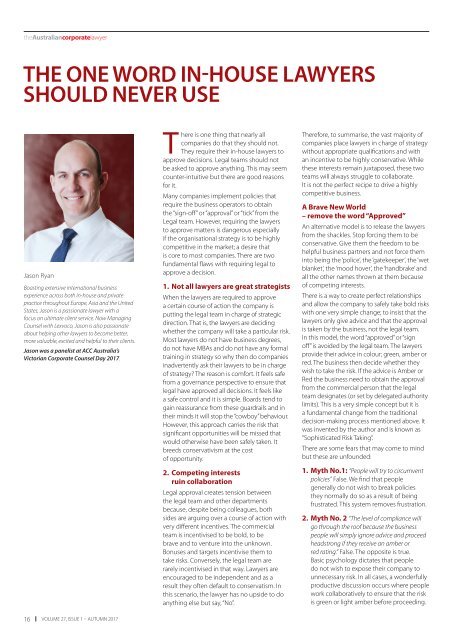Australian Corporate Lawyer - Autumn 2017
Australian Corporate Lawyer is the official publication of the Association of Corporate Counsel (ACC) Australia. The Autumn 2018 issue focuses on 'The Law and Technology' and features a range of articles covering topics including: the future of contracts and; the future of law firms as software companies..
Australian Corporate Lawyer is the official publication of the Association of Corporate Counsel (ACC) Australia. The Autumn 2018 issue focuses on 'The Law and Technology' and features a range of articles covering topics including: the future of contracts and; the future of law firms as software companies..
Create successful ePaper yourself
Turn your PDF publications into a flip-book with our unique Google optimized e-Paper software.
the<strong>Australian</strong>corporatelawyer<br />
THE ONE WORD IN-HOUSE LAWYERS<br />
SHOULD NEVER USE<br />
Jason Ryan<br />
Boasting extensive international business<br />
experience across both in-house and private<br />
practice throughout Europe, Asia and the United<br />
States, Jason is a passionate lawyer with a<br />
focus on ultimate client service. Now Managing<br />
Counsel with Lexvoco, Jason is also passionate<br />
about helping other lawyers to become better,<br />
more valuable, excited and helpful to their clients.<br />
Jason was a panelist at ACC Australia’s<br />
Victorian <strong>Corporate</strong> Counsel Day <strong>2017</strong>.<br />
There is one thing that nearly all<br />
companies do that they should not.<br />
They require their in-house lawyers to<br />
approve decisions. Legal teams should not<br />
be asked to approve anything. This may seem<br />
counter-intuitive but there are good reasons<br />
for it.<br />
Many companies implement policies that<br />
require the business operators to obtain<br />
the “sign-off” or “approval” or “tick” from the<br />
Legal team. However, requiring the lawyers<br />
to approve matters is dangerous especially<br />
if the organisational strategy is to be highly<br />
competitive in the market; a desire that<br />
is core to most companies. There are two<br />
fundamental flaws with requiring legal to<br />
approve a decision.<br />
1. Not all lawyers are great strategists<br />
When the lawyers are required to approve<br />
a certain course of action the company is<br />
putting the legal team in charge of strategic<br />
direction. That is, the lawyers are deciding<br />
whether the company will take a particular risk.<br />
Most lawyers do not have business degrees,<br />
do not have MBAs and do not have any formal<br />
training in strategy so why then do companies<br />
inadvertently ask their lawyers to be in charge<br />
of strategy? The reason is comfort. It feels safe<br />
from a governance perspective to ensure that<br />
legal have approved all decisions. It feels like<br />
a safe control and it is simple. Boards tend to<br />
gain reassurance from these guardrails and in<br />
their minds it will stop the “cowboy” behaviour.<br />
However, this approach carries the risk that<br />
significant opportunities will be missed that<br />
would otherwise have been safely taken. It<br />
breeds conservativism at the cost<br />
of opportunity.<br />
2. Competing interests<br />
ruin collaboration<br />
Legal approval creates tension between<br />
the legal team and other departments<br />
because, despite being colleagues, both<br />
sides are arguing over a course of action with<br />
very different incentives. The commercial<br />
team is incentivised to be bold, to be<br />
brave and to venture into the unknown.<br />
Bonuses and targets incentivise them to<br />
take risks. Conversely, the legal team are<br />
rarely incentivised in that way. <strong>Lawyer</strong>s are<br />
encouraged to be independent and as a<br />
result they often default to conservatism. In<br />
this scenario, the lawyer has no upside to do<br />
anything else but say, “No”.<br />
Therefore, to summarise, the vast majority of<br />
companies place lawyers in charge of strategy<br />
without appropriate qualifications and with<br />
an incentive to be highly conservative. While<br />
these interests remain juxtaposed, these two<br />
teams will always struggle to collaborate.<br />
It is not the perfect recipe to drive a highly<br />
competitive business.<br />
A Brave New World<br />
– remove the word “Approved”<br />
An alternative model is to release the lawyers<br />
from the shackles. Stop forcing them to be<br />
conservative. Give them the freedom to be<br />
helpful business partners and not force them<br />
into being the ‘police’, the ‘gatekeeper’, the ‘wet<br />
blanket’, the ‘mood hover’, the ‘handbrake’ and<br />
all the other names thrown at them because<br />
of competing interests.<br />
There is a way to create perfect relationships<br />
and allow the company to safely take bold risks<br />
with one very simple change; to insist that the<br />
lawyers only give advice and that the approval<br />
is taken by the business, not the legal team.<br />
In this model, the word “approved” or “sign<br />
off” is avoided by the legal team. The lawyers<br />
provide their advice in colour; green, amber or<br />
red. The business then decide whether they<br />
wish to take the risk. If the advice is Amber or<br />
Red the business need to obtain the approval<br />
from the commercial person that the legal<br />
team designates (or set by delegated authority<br />
limits). This is a very simple concept but it is<br />
a fundamental change from the traditional<br />
decision-making process mentioned above. It<br />
was invented by the author and is known as<br />
“Sophisticated Risk Taking”.<br />
There are some fears that may come to mind<br />
but these are unfounded:<br />
1. Myth No.1: “People will try to circumvent<br />
policies” False. We find that people<br />
generally do not wish to break policies<br />
they normally do so as a result of being<br />
frustrated. This system removes frustration.<br />
2. Myth No. 2 “The level of compliance will<br />
go through the roof because the business<br />
people will simply ignore advice and proceed<br />
headstrong if they receive an amber or<br />
red rating.” False. The opposite is true.<br />
Basic psychology dictates that people<br />
do not wish to expose their company to<br />
unnecessary risk. In all cases, a wonderfully<br />
productive discussion occurs where people<br />
work collaboratively to ensure that the risk<br />
is green or light amber before proceeding.<br />
16 VOLUME 27, ISSUE 1 – AUTUMN <strong>2017</strong>

















